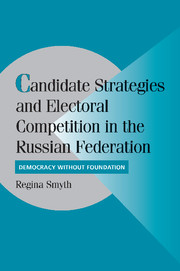 Candidate Strategies and Electoral Competition in the Russian Federation
Candidate Strategies and Electoral Competition in the Russian Federation Published online by Cambridge University Press: 25 July 2009
Elections and representation are two different institutions.
Yury Sharandin, chair of the Constitutional Legislation Committee of the Federation CouncilIn describing the third wave of democratic transitions, Samuel Huntington (1991) wrote that the introduction of elections signals the death of authoritarian systems. Subsequent developments have demonstrated that the relationship between elections and regime change is much more complicated. Yes, the critical event in the consolidation period is the introduction of competitive elections. However, electoral competition does not always mark the death of an authoritarian regime. Rather, it signals the beginning of building a new regime while grappling with the vestiges of the old, a process that can end in a range of outcomes from stable, responsive, and accountable democracy to authoritarian revival.
This book explores the role that electoral competition plays in the evolution of transitional regimes. Its premise is that understanding how individual politicians respond to incentives in the newly established electoral arena helps to explain the success or failure of democratic consolidation. While the empirical focus of this book is largely on the Russian Federation, the theoretic framework illuminates the broader implications of electoral politics in new democracies.
As Russia emerged from its democratization period and undertook competitive elections in 1993, optimism about the country's chances of achieving democratic goals was boundless. Analysts declared that the Communist Party – and by implication the authoritarian regime – was over. Elections, they argued, had supplanted both the party and authoritarian rule, and would serve as the basis for a stable democracy.
To save this book to your Kindle, first ensure [email protected] is added to your Approved Personal Document E-mail List under your Personal Document Settings on the Manage Your Content and Devices page of your Amazon account. Then enter the ‘name’ part of your Kindle email address below. Find out more about saving to your Kindle.
Note you can select to save to either the @free.kindle.com or @kindle.com variations. ‘@free.kindle.com’ emails are free but can only be saved to your device when it is connected to wi-fi. ‘@kindle.com’ emails can be delivered even when you are not connected to wi-fi, but note that service fees apply.
Find out more about the Kindle Personal Document Service.
To save content items to your account, please confirm that you agree to abide by our usage policies. If this is the first time you use this feature, you will be asked to authorise Cambridge Core to connect with your account. Find out more about saving content to Dropbox.
To save content items to your account, please confirm that you agree to abide by our usage policies. If this is the first time you use this feature, you will be asked to authorise Cambridge Core to connect with your account. Find out more about saving content to Google Drive.